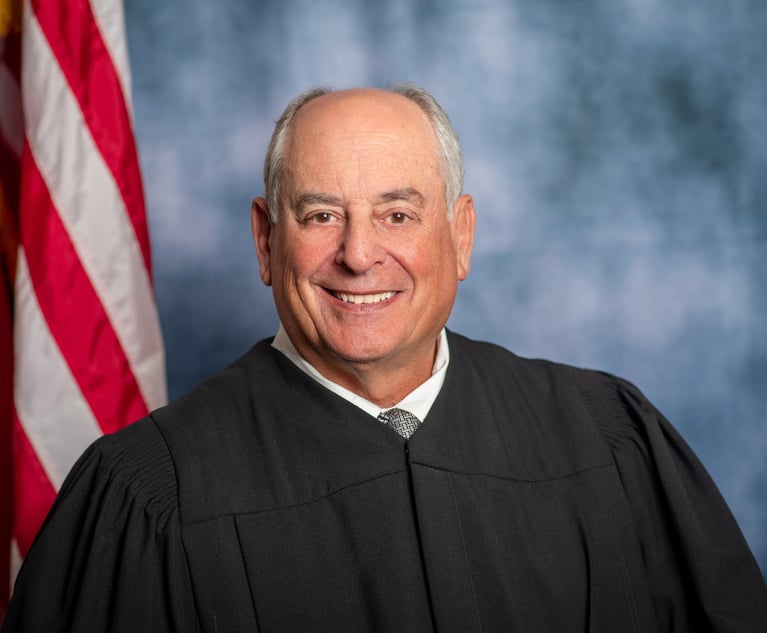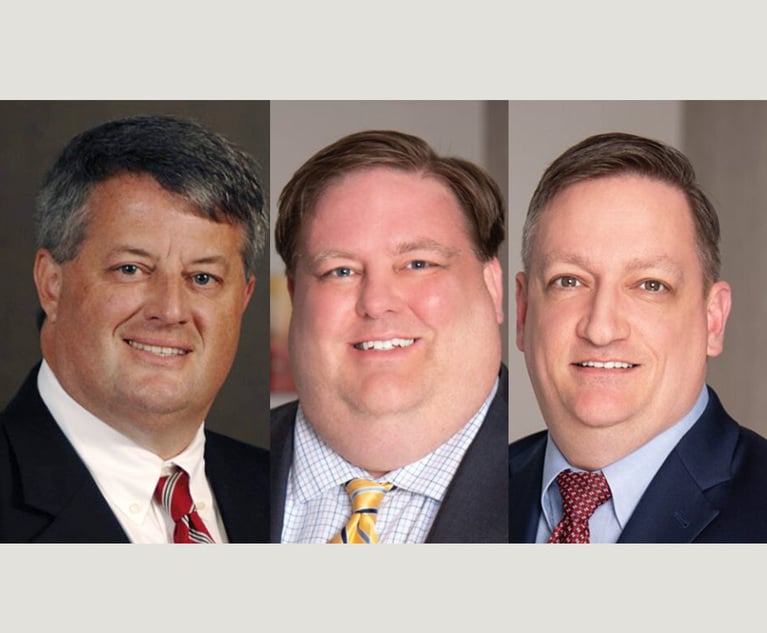 Georgia Attorney General Chris Carr (from left), Florida Attorney General Ashley Moody and Alabama Attorney General Steve Marshall. (Courtesy photos)
Georgia Attorney General Chris Carr (from left), Florida Attorney General Ashley Moody and Alabama Attorney General Steve Marshall. (Courtesy photos)AGs in 11th Circuit Ask SCOTUS to Rethink Abortion Precedent
Georgia Attorney General Chris Carr, Florida Attorney General Ashley Moody and Alabama Attorney General Steve Marshall argued their states restrictions on abortion protect women from providers with "a macabre history of disregarding basic clinical competence and sanitation."
January 03, 2020 at 04:44 PM
5 minute read
The attorneys general of Georgia, Florida and Alabama filed a brief Thursday urging the U.S. Supreme Court to overturn its precedent in favor of women's right to choose whether to end a pregnancy.
The 49-page brief, filed in a case over a Louisiana abortion law taken up by the high court, outlined a strategy for defending abortion restrictions in the three states overseen by the U.S. Court of Appeals for the Eleventh Circuit based in Atlanta.
"Amici States routinely face preenforcement challenges to their abortion laws brought by abortion providers," Georgia Attorney General Chris Carr, Florida Attorney General Ashley Moody and Alabama Attorney General Steve Marshall said in the brief. "In such cases, abortion practitioners regularly assert the rights of hypothetical future patients without presenting direct evidence of how the challenged law will actually impact women seeking abortion. This case provides an opportunity to clarify this Court's doctrine on the availability of third-party standing to challenge state health-and-safety regulations, the proper standard for preenforcement challenges in the abortion context, and how lower courts should conduct the balancing analysis set forth in Whole Woman's Health v. Hellerstedt, 136 S. Ct. 2292 (2016)."
Both Carr and Marshall are already appealing federal judges' orders blocking abortion restrictions in their own states. Georgia's law bans abortion as soon as doctors can detect fetal pulse sounds. The Alabama law bans all abortions, with no exceptions.
The three Eleventh Circuit AGs joined their counterparts from a total of 20 states asking the high court to reconsider its abortion rights rulings in Roe v. Wade and Planned Parenthood v. Casey. The AGs wrote in support of a Louisiana law requiring doctors who provide abortions to have admitting privileges at hospitals within 30 miles of the clinic. Abortion rights advocates have argued that that requirement is unnecessary because so few abortions lead to hospitalizations and that it imposes an "undue burden" on women—precluded by Planned Parenthood v. Casey.
The U.S. Court of Appeals for the Fifth Circuit in New Orleans has upheld the Louisiana law. The AGs asked the Supreme Court to affirm the Fifth Circuit or order the dismissal of the challenge. They made three arguments in favor of the Louisiana law. They said the medical providers challenging it lack standing to do so—an argument also made in other cases, including Georgia's. They said preenforcement challenges can't provide evidence of women being affected by laws that have not yet taken effect. And they argued for a different analysis to be used in lower courts.
"In rejecting Petitioners' claims, the Fifth Circuit properly applied Hellerstedt's weighing analysis. Unlike the Fifth Circuit, some lower courts have wrongly suggested that Hellerstedt requires invalidating a health-and-safety regulation any time its burdens marginally outweigh its benefits. But a regulation only imposes an undue burden where it is substantially more burdensome than beneficial," the AGs said.
"Amici States urge the Court to preclude abortion providers from invoking the rights of hypothetical future patients in challenging health-and-safety regulations (such as admitting-privileges requirements) designed to protect those patients," the AGs said. "The Court should also hold that a preenforcement facial challenge to an abortion regulation cannot succeed without evidence of the challenged regulation's actual impact on women. And should the Court reach the merits of Petitioners' challenge, the Court should clarify that health-and-safety regulations impose an undue burden only if the burdens they impose—by causing women to forgo an abortion or materially delay and face significantly greater risks—substantially outweigh those regulations' benefits."
The AGs argued that their states' restrictions on abortion protect women from providers with "a macabre history of disregarding basic clinical competence and sanitation."
"That history underscores why courts and the States cannot trust practitioners to safeguard women's interests," the AGs said. "Third-party standing requires a unity of interests, which practitioners lack when challenging regulations that protect women from practitioners themselves."
The brief cited a list of instances where abortion providers had been found to be operating in unsafe and unsanitary clinics. The AGs alleged that clinics had used patients' interests to support their own business models.
The AG's brief tracked with another filed the same day by 39 Republican U.S. senators and 160 members of the U.S. House of Representatives urging the Supreme Court to reconsider its abortion rights rulings.
Stroock & Stroock & Lavan filed a brief last month on behalf of 36 Senate Democrats supporting the Supreme Court's abortion rights rulings in Roe v. Wade and Planned Parenthood v. Casey.
The Supreme Court is to hold oral arguments on the Louisiana appeal on March 4.
The case is June Medical Services v. Dr. Rebekah Gee, Secretary, Louisiana Department of Health and Hospitals, Nos. 18-1323, 18-1460.
This content has been archived. It is available through our partners, LexisNexis® and Bloomberg Law.
To view this content, please continue to their sites.
Not a Lexis Subscriber?
Subscribe Now
Not a Bloomberg Law Subscriber?
Subscribe Now
NOT FOR REPRINT
© 2024 ALM Global, LLC, All Rights Reserved. Request academic re-use from www.copyright.com. All other uses, submit a request to [email protected]. For more information visit Asset & Logo Licensing.
You Might Like
View All
'A 58-Year-Old Engine That Needs an Overhaul': Judge Wants Traffic Law Amended
3 minute read
Fulton Jury Returns Defense Verdict After Pedestrian Killed by MARTA Bus
8 minute read
'The Best Strategy': $795K Resolution Reached in Federal COVID-Accommodation Dispute
8 minute read
Population and Caseload Boom Birth New West Georgia Judicial Circuit
7 minute readTrending Stories
- 1'Largest Retail Data Breach in History'? Hot Topic and Affiliated Brands Sued for Alleged Failure to Prevent Data Breach Linked to Snowflake Software
- 2Former President of New York State Bar, and the New York Bar Foundation, Dies As He Entered 70th Year as Attorney
- 3Legal Advocates in Uproar Upon Release of Footage Showing CO's Beat Black Inmate Before His Death
- 4Longtime Baker & Hostetler Partner, Former White House Counsel David Rivkin Dies at 68
- 5Court System Seeks Public Comment on E-Filing for Annual Report
Who Got The Work
Michael G. Bongiorno, Andrew Scott Dulberg and Elizabeth E. Driscoll from Wilmer Cutler Pickering Hale and Dorr have stepped in to represent Symbotic Inc., an A.I.-enabled technology platform that focuses on increasing supply chain efficiency, and other defendants in a pending shareholder derivative lawsuit. The case, filed Oct. 2 in Massachusetts District Court by the Brown Law Firm on behalf of Stephen Austen, accuses certain officers and directors of misleading investors in regard to Symbotic's potential for margin growth by failing to disclose that the company was not equipped to timely deploy its systems or manage expenses through project delays. The case, assigned to U.S. District Judge Nathaniel M. Gorton, is 1:24-cv-12522, Austen v. Cohen et al.
Who Got The Work
Edmund Polubinski and Marie Killmond of Davis Polk & Wardwell have entered appearances for data platform software development company MongoDB and other defendants in a pending shareholder derivative lawsuit. The action, filed Oct. 7 in New York Southern District Court by the Brown Law Firm, accuses the company's directors and/or officers of falsely expressing confidence in the company’s restructuring of its sales incentive plan and downplaying the severity of decreases in its upfront commitments. The case is 1:24-cv-07594, Roy v. Ittycheria et al.
Who Got The Work
Amy O. Bruchs and Kurt F. Ellison of Michael Best & Friedrich have entered appearances for Epic Systems Corp. in a pending employment discrimination lawsuit. The suit was filed Sept. 7 in Wisconsin Western District Court by Levine Eisberner LLC and Siri & Glimstad on behalf of a project manager who claims that he was wrongfully terminated after applying for a religious exemption to the defendant's COVID-19 vaccine mandate. The case, assigned to U.S. Magistrate Judge Anita Marie Boor, is 3:24-cv-00630, Secker, Nathan v. Epic Systems Corporation.
Who Got The Work
David X. Sullivan, Thomas J. Finn and Gregory A. Hall from McCarter & English have entered appearances for Sunrun Installation Services in a pending civil rights lawsuit. The complaint was filed Sept. 4 in Connecticut District Court by attorney Robert M. Berke on behalf of former employee George Edward Steins, who was arrested and charged with employing an unregistered home improvement salesperson. The complaint alleges that had Sunrun informed the Connecticut Department of Consumer Protection that the plaintiff's employment had ended in 2017 and that he no longer held Sunrun's home improvement contractor license, he would not have been hit with charges, which were dismissed in May 2024. The case, assigned to U.S. District Judge Jeffrey A. Meyer, is 3:24-cv-01423, Steins v. Sunrun, Inc. et al.
Who Got The Work
Greenberg Traurig shareholder Joshua L. Raskin has entered an appearance for boohoo.com UK Ltd. in a pending patent infringement lawsuit. The suit, filed Sept. 3 in Texas Eastern District Court by Rozier Hardt McDonough on behalf of Alto Dynamics, asserts five patents related to an online shopping platform. The case, assigned to U.S. District Judge Rodney Gilstrap, is 2:24-cv-00719, Alto Dynamics, LLC v. boohoo.com UK Limited.
Featured Firms
Law Offices of Gary Martin Hays & Associates, P.C.
(470) 294-1674
Law Offices of Mark E. Salomone
(857) 444-6468
Smith & Hassler
(713) 739-1250






